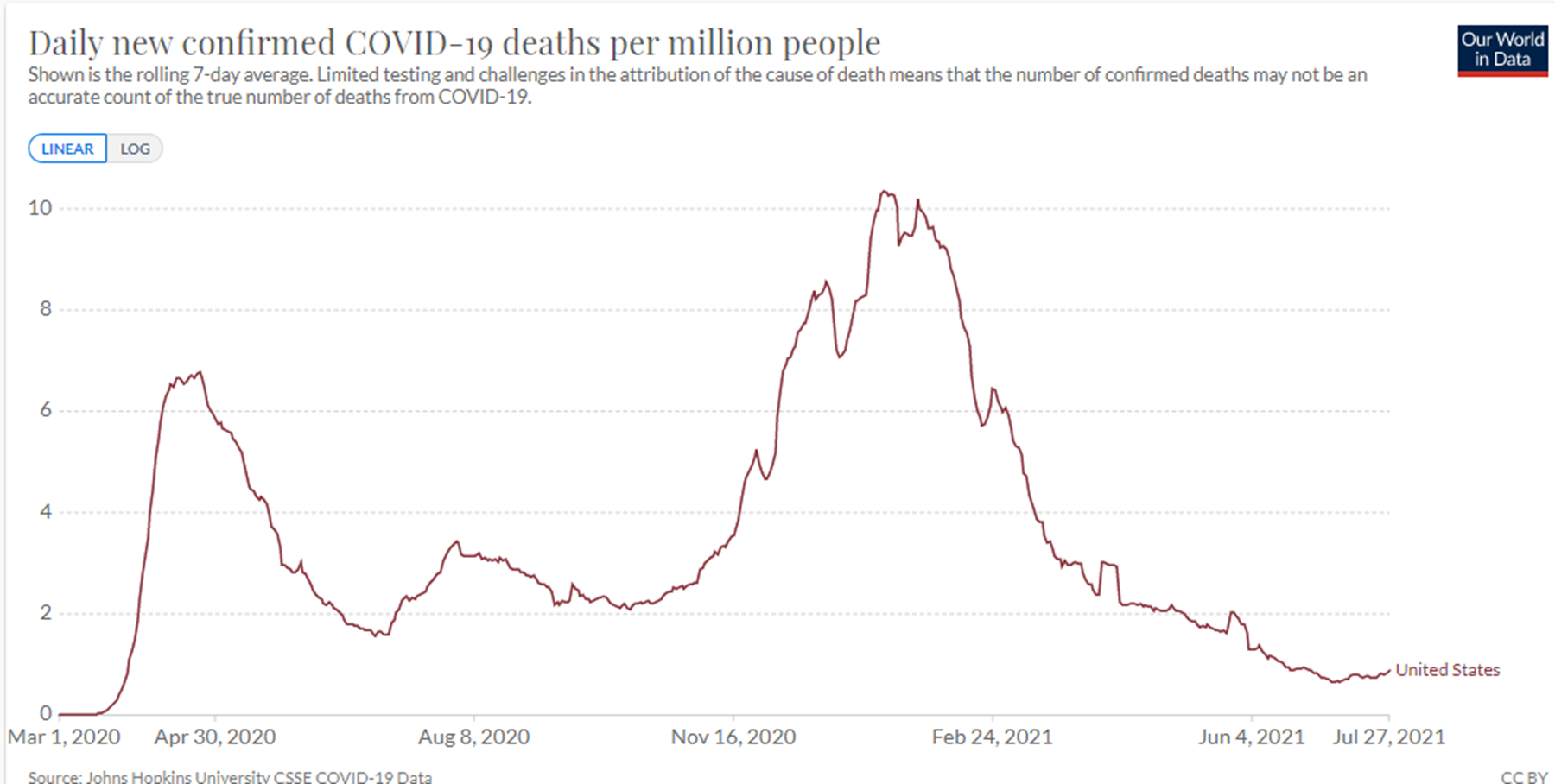Far more people were dying from COVID-19 months ago as we were winding down restrictions than are dying today as some call to reinstate them.
by Brad Polumbo

Image Credit: Our World In Data
If you judged the US’s current COVID-19 situation only by the headlines, you’d come away thinking that we’re spiraling back into pandemic disaster. Localities like Los Angeles County and St. Louis have reimposed mask mandates on their citizens, and the Centers for Disease Control and Prevention just revised its “guidance” to say that, actually, fully vaccinated individuals should still wear masks in certain situations. Meanwhile, mainstream media coverage of the rise of the “Delta variant” is soaked in alarmism.
Yet at the same time that all this alarm is mounting, the actual number of COVID-19 deaths is at a nadir. Harvard Medical School Professor Martin Kulldorff pointed this out on Twitter, writing that “In [the] USA, COVID mortality is now the lowest since the start of the pandemic in March 2020.”
He shared this graph from OurWorldInData which clearly shows how COVID deaths per million are at, relatively speaking, extreme lows. Far more people were dying from COVID-19 months ago as we were winding down restrictions than are dying today as some call to reinstate them.
Now, some would cite rising COVID-19 case counts or hospitalizations in certain parts of the country as evidence that the pandemic is indeed once again spiraling out of control. But many COVID-19 cases recorded as positive are either asymptomatic or come with very mild symptoms — especially the cases confirmed among vaccinated individuals — so high case counts are not necessarily proof of a serious problem.
Hospitalizations are concerning, yes, but primarily insofar as they lead to high numbers of deaths, which, thankfully, is not the case so far with the Delta variant.
Others would say that deaths are a “lagging indicator” that come in several weeks after the increased spread of the disease. But the Delta variant has been spreading in the US for months now, and deaths have remained relatively flat, in part due to widespread vaccination.
“It is striking that COVID mortality is at such low levels despite the fact that we are seeing an increase in cases of late,” Stanford Professor of Medicine Dr. Jay Bhattacharya tells FEE.
“By immunizing the elderly and many other vulnerable people, we have provided them with excellent protection against severe disease in case they get infected. Also contributing is widespread natural immunity from recovered COVID patients. Though cases may rise, deaths will no longer follow in proportion. We have effectively defanged the disease with our successful vaccination rollout.”
So, there’s simply no reason to expect the long downward trend in deaths shown in the above graph to suddenly spike upwards. And we can’t make public policy based on worst-case scenarios.
That’s right: despite all the alarmism and clamor for renewed restrictions on our liberty, there’s not really been a resurgence in the state of the COVID-19 crisis itself.
“We should be declaring a great and resounding success,” Bhattacharya told FEE in conclusion.
“The COVID emergency is over. We still need to take COVID seriously, and there are still vulnerable people here and abroad left to vaccinate. But we can start to treat it as one disease among many that afflict people rather than an all-consuming threat.”
Of course, proponents of big government and government officials themselves will be the last ones to acknowledge the reality that the most dangerous phase of this pandemic has long since come to an end in the US. Why? Because the rhetoric of “emergency” and “crisis” is the government’s favorite tool to use in expanding and maintaining its power over our lives.
“‘Emergencies’ have always been the pretext on which the safeguards of individual liberty have eroded,” as Nobel-Prize-winning economist Freidrich Hayek put it. “And once they are suspended it is not difficult for anyone who has assumed emergency powers to see to it that the emergency will persist.”
Examples of this timeless truth abound throughout history up until present day: from the internment of Japanese-Americans during World War II to the now-permanent infringements on our civil liberties after 9/11 to the sweeping expansion of government control during the COVID-19 pandemic.
But, whether politicians like it or not, the COVID-19 crisis is largely over. So don’t fall for cynical arguments from power-hungry individuals who want their “emergency” powers to become permanent.
 RSS Feed
RSS Feed















 July 31st, 2021
July 31st, 2021  Awake Goy
Awake Goy  Posted in
Posted in  Tags:
Tags: 













